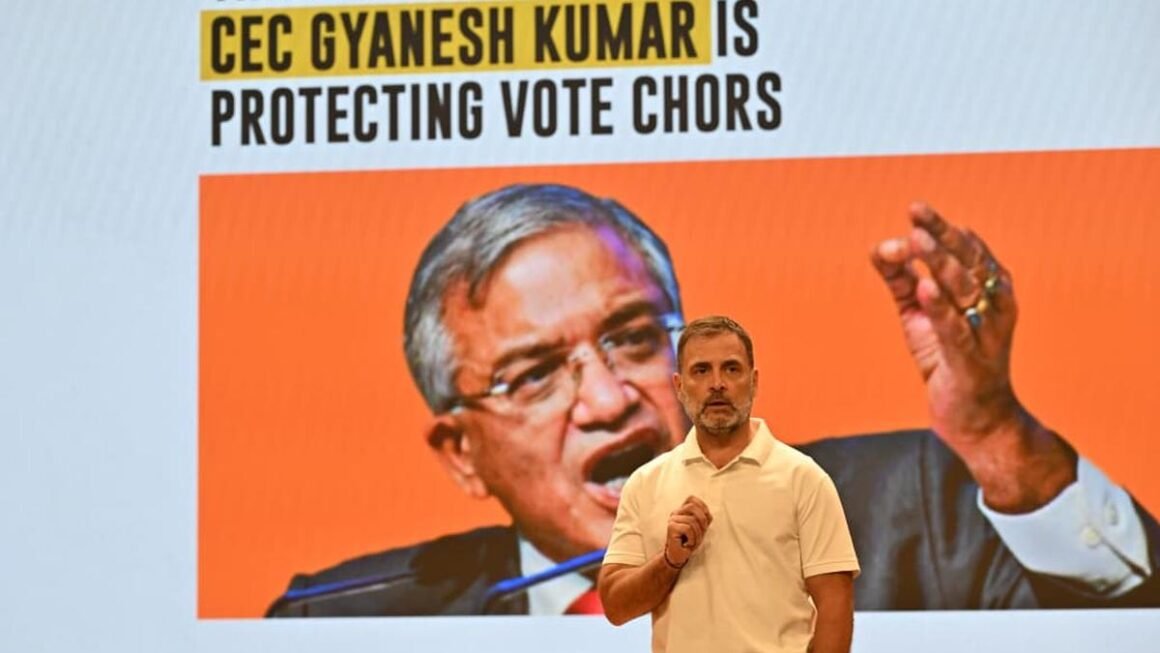
Punchline: When voter lists vanish by software and phones, Rahul Gandhi’s ‘hydrogen bomb’ warns that democracy itself is on the line in Aland and beyond.
A Dramatic Allegation Goes Public
In a fiery press conference on September 18, 2025, Congress leader Rahul Gandhi dropped what he described as a political “hydrogen bomb.” He accused the Election Commission of India (ECI) of allowing large-scale voter name deletions in Karnataka’s Aland Assembly constituency. According to Gandhi, these deletions were not random errors but part of a systematic operation involving fake applications, specialized software, and mobile numbers registered outside the state. His statement has electrified the political discourse, with opposition leaders rallying behind him and the ruling BJP dismissing it as baseless.
The Numbers at the Core
At the center of Gandhi’s allegation lies a startling figure: 6,018 voter names flagged for deletion in Aland. Of these, only 24 applications were found to be genuine, while the remaining 5,994 were allegedly fake. Local MLA BR Patil, who had raised this issue earlier, confirmed the figures, claiming that the attempt was a deliberate effort to weaken Congress’s voter base in the constituency. Patil noted that many of the targeted names belonged to marginalized groups and communities known to support the Congress, making the deletions both politically charged and socially unjust.
How It Was Done: Software and Phones
Rahul Gandhi explained that the scheme involved targeting the first name on voter lists from multiple booths, systematically filing Form-7 applications for their deletion. These fraudulent requests, he alleged, were generated using specialized software tools and verified through mobile phone numbers traced to regions outside Karnataka. Fake logins and repeated submissions indicated a coordinated conspiracy rather than isolated misconduct. Gandhi further alleged that these methods mirror strategies used by organized crime syndicates, suggesting a dangerous collusion between political interests and technological manipulation.
Election Commission Under Fire
One of the sharpest points of criticism was directed at the Election Commission and Chief Election Commissioner Gyanesh Kumar. Gandhi accused them of ignoring repeated red flags raised by state officials. The Karnataka CID, tasked with investigating the matter, reportedly sent 18 letters over 18 months requesting access logs, OTP records, and IP addresses to trace the origin of fake applications. According to Gandhi, the ECI’s reluctance or failure to provide this technical data raises serious questions of negligence, if not outright complicity. The lack of transparency, he claimed, undermines the Commission’s credibility as a neutral arbiter of democracy.
Responses and Counterclaims
The Election Commission swiftly rejected Gandhi’s accusations, labeling them “incorrect and baseless.” Officials reiterated that no voter can be deleted online without verification by local officers and an opportunity for the voter to appeal. The Commission admitted that there may have been attempts at fraudulent deletions but insisted that these were detected and nullified before affecting the final rolls. The BJP, meanwhile, attacked Rahul Gandhi for what it called “fear-mongering,” accusing him of questioning institutions to cover up his party’s electoral weaknesses. They argued that the Congress was attempting to pre-emptively discredit electoral processes ahead of upcoming state polls.
Political and Public Repercussions
Despite official denials, Gandhi’s explosive claims have reignited debates about the security of India’s electoral rolls. His assertion that booths favoring Congress were disproportionately targeted has fueled suspicion of political bias in the deletion attempts. Civil society groups and election watchdogs have called for an independent judicial inquiry, while local voters in Aland expressed fears that they may be disenfranchised during the next election. Opposition leaders across INDIA bloc states are now demanding that the ECI release all digital logs related to voter deletions nationwide.
A Pattern Beyond Aland?
Perhaps most alarming was Gandhi’s suggestion that Aland could be the tip of the iceberg. He hinted at similar patterns in other constituencies, warning that this was not an isolated case but part of a larger, nationwide strategy to suppress opposition votes. “Today it is Aland, tomorrow it may be your constituency,” he said, urging citizens to demand accountability. The possibility that such tampering could be systemic has set off alarm bells across the political spectrum.
The Bigger Picture: Democracy on Trial
If the allegations are substantiated, they could mark one of the most significant electoral scandals in recent Indian history. The scandal highlights vulnerabilities in the voter registration system, especially the Form-7 process for deletions. Analysts warn that even the perception of manipulated rolls could erode public trust in elections, damaging the credibility of democratic institutions. At a time when India is being closely watched as the world’s largest democracy, these revelations strike at the heart of electoral legitimacy.
Rahul Gandhi’s ‘hydrogen bomb’ revelation is not merely political theatre; it raises profound questions about whether India’s democratic machinery is secure against manipulation. If voter names can vanish through software tricks and fake phones, then the very foundation of free and fair elections demands urgent repair.
FOR MORE BLOGS – beyondthepunchlines.com

 Add to favorites
Add to favorites








